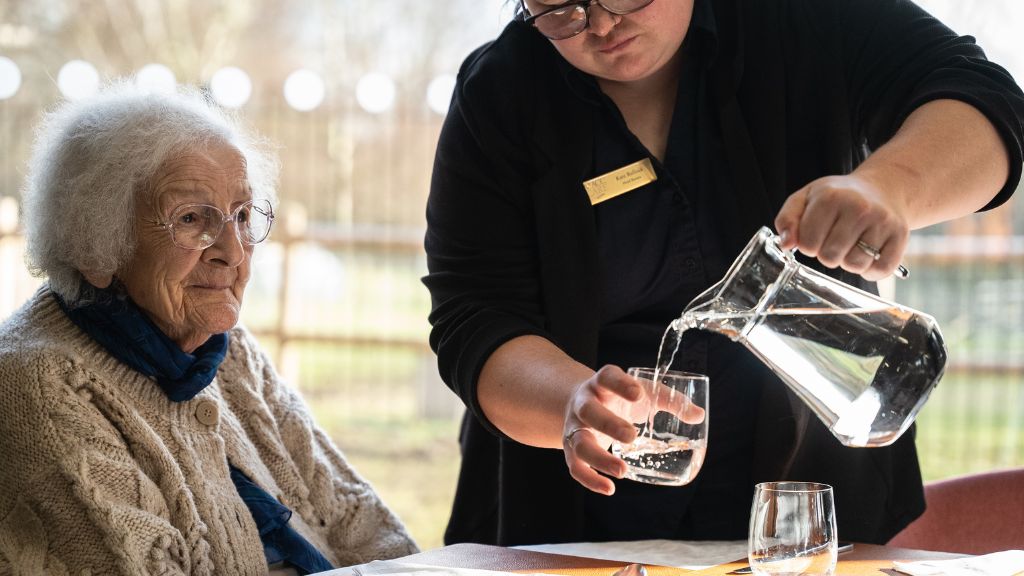The power of music
Music has a valuable role to play in enhancing the quality of life of people living with dementia, as well as their carers. Director of the Music for Dementia campaign, Grace Meadows, encourages care workers to unlock the power of music to support their own health and wellbeing.

For several years Music for Dementia has campaigned for people with dementia to have music as an intrinsic part of their care and support whatever their circumstances, and the organisation is calling on the social care sector to help make it an integral part of dementia care.
Research and lived experiences show that music can help reduce the often-distressing symptoms of dementia, such as agitation and anxiety, but these benefits are not restricted to the person living with dementia, they also extend to caregivers.
For music to be an integral part of dementia care in care settings, it is essential that care workers are empowered and given the skills to use music, in all its different forms, as part of the day-to-day delivery and support provided to people with dementia living in care settings.
Against a backdrop of workforce challenges, funding pressures and concerns about staff wellbeing, with stress and burnout being at its highest reported among health and social care workers from the pandemic, we have a workforce that needs supporting. Although not a magical cure or a substitute for therapy, medication or any other professional intervention, music can be an important element of self-care.
For several decades now, music has been used in dementia care to support and enhance quality of life. The evidence base for its effectiveness and impact has been growing, but it remains for many something that is considered a nicety and not a necessity to support those living with dementia and caregivers. As we recover and rehabilitate from the pandemic, now more than ever we need to use the power of music to support the social care workforce in the essential work they do in caring for people living with dementia in care settings. Music has many therapeutic benefits that can help the care workforce improve their own health and wellbeing to cope with many of the pressures experienced by care workers like stress, burnout and anxiety.
Managing stress
Research suggests that music has significant power to help reduce stress and anxiety. Stress – the feeling of emotional tension, being overwhelmed or feeling unable to manage, affects us mentally and physically, causing our bodies to release specific hormones and chemicals that activate the brain in certain ways. A highly stressful situation can cause your heart rate and blood pressure to produce cortisol, also known as the stress hormone.
Short term, cortisol can help us find the focus and energy we need to deal with difficult situations, but if the body is exposed to excess cortisol for a prolonged period, it causes exhaustion and can lead to anxiety, depression and other health conditions. Music can be used as a therapeutic tool to help reduce stress and promote healing to improve the overall emotional wellbeing.
Music can also help manage anxiety. Data from University College London suggests that people who spent 30 minutes or more each day during the pandemic on arts activities, such as listening to music, have lower reported rates of depression and anxiety, and a greater life satisfaction.
The Spitz Charitable Trust takes professional musicians into care homes, day centres and hospitals and are embedded in Bridgeside Lodge care home in Islington, London. Through live music they connect with people to help improve their wellbeing and quality of life. Jane Glitre, director of The Spitz Charitable Trust said: “After the first lockdown when no one could go in to care homes, we were welcomed back as long-lost friends and at that point we noticed a significant shift – there was greater equality and partnership in how we worked together with the care staff. There was no longer the feeling of us and them. The staff began to see us as being essential to supporting them to do their work in supporting people living with dementia in their care.”
Agnes, a nurse from Bridgeside Lodge, said: “For us carers coming to work isn’t always easy. When I come into this environment, music gives me more power to do my job, more energy. It helps the residents to relax and feel less anxious, which helps me to do a better job – a job that I can enjoy because I see the residents happy. And when they are happy then I’m happy.”
One of the great benefits of music as a stress reliever is that it can be used while you get on with your regular activities and so doesn’t take you away from your busy schedule. When there’s live music at Bridgeside Lodge, the carers said it makes their working day easier and more relaxed – whether they are completing the medication round, providing personal care or cleaning the floors – “The music makes me happy at work”.
Aid to focus
Most research into the health benefits from music centre on its ability to calm us down and relieve stress, but music can also be used as an aid to focus on certain tasks or help sharpen our brain’s ability to recall information and make connections.
Together with Music, an intergenerational music-making programme connects care homes, community groups and schools through music. Its ‘4 Nations Song Writing Tour’ is a two-day programme that trains care staff and creatives to host music workshops to improve mental health and wellbeing.
Deborah, from Campbell Snowden care home in Scotland took part in the training and was inspired to use music to support her team as well as her residents. Deborah is now using music as an integral part of how the team provide care and to support the wellbeing of staff, even using music in staff meetings and to support daily activities in the care home.
A helpful distraction
Sometimes you need something to take your mind off your stresses and music can be a good distraction as it can divert focus and renew attention.
If you feel anxious or overwhelmed, or if you need to support somebody who may be anxious, music could be a helpful distraction. A favourite song that could be enjoyed together with the person living with dementia can create strong bonds and take the mind off more difficult situations; the distraction could help staff to deliver personal care in a way that is personal and meaningful, bringing calm to a stressful situation, and even make you feel a lot better.
Makes you feel good
There is strong evidence that music stimulates the production of dopamine, the ‘feel good’ hormone in our bodies. When dopamine increases in the brain, you can experience positive emotions in the same areas of the brain where pleasure is experienced. This can help lift mood and relieve stress.
Jane Glitre continues: “There is so much creativity within care workers – singing, dancing, playing instruments – that the music sessions help staff find creative ways to express themselves and connect with their residents. The imaginative ways in which care workers engage with residents in turn gives the residents the confidence to express their own creativity in a multitude of ways. For example, when a carer sings to a resident, the resident may respond by dancing or singing and this helps them to connect in creative ways.”
Sleep better
Certain music can help with sleep. Listening to soothing music can help you wind down and relax, lower the heart rate and help your breathing to slow down. Relaxing music can trigger the release of feel-good chemicals in the brain that in turn can help you to sleep better.
Emotional exhaustion can impact our ability to switch off and get a good night’s sleep. We want to see carers use the power of music to support their own health and wellbeing so that they personally experience music’s multiple benefits in their own lives, especially as they support and care for people living with dementia.
Director of the Music for Dementia campaign, Grace Meadows has a life-long career in music, having initially trained as a professional bassoonist. For the past decade she has worked as a qualified music therapist in a variety of health, social care and educational settings with children and adults across the lifespan. Her early campaign experience was developed at the Music Manifesto, and Sing Up, the national programme to reinstate singing in primary schools. A passionate voice for the power and value of music, Grace later worked for the British Association for Music Therapy, advocating for the inclusion of music and music therapy across health, social care and educational systems. musicfordementia.org.uk




